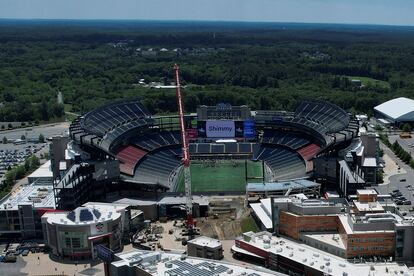With seven matches for the 2026 World Cup, Boston expecting huge economic boost
Among the seven matches that will be played at Gillette Stadium in the Boston suburb of Foxborough will be five group stage matches, one match in the round of 32 and a quarterfinal match on July 9

Getting the chance to host seven matches for the 2026 World Cup was more than expected and offers a much-needed shot in the arm to the city’s economy, Boston officials said Monday.
FIFA made the announcement Sunday, allocating the opener of the 39-day tournament to Mexico City’s Estadio Azteca and the finale to the home of the NFL’s New York Jets and Giants. Among the seven matches that will be played at Gillette Stadium in the Boston suburb of Foxborough will be five group stage matches, one match in the round of 32 and a quarterfinal match on July 9, 2026.
Mike Loynd, president of Boston Soccer 26, acknowledged organizers were projecting about five or six matches and no quarterfinal, meaning the final schedule “is a great economic benefit.”
“The later in the tournament, the more eyeballs,” he said. “For us, it’s just a matter of excitement ... For us, it’s a perfect schedule. I don’t think FIFA could have done a better job.”
Martha Sheridan, president & CEO of Meet Boston, said “nothing compares” to hosting World Cup matches. Foxborough hosted games at the 1994 World Cup, but Gillette Stadium is a different venue, built near the old Foxboro Stadium. Foxborough also hosted matches during the 1999 and 2003 Women’s World Cup.
Sheridan said a FIFA study projected for a city hosting the World Cup would generate $400 million in spending, adding that the number would have to be adjusted now that the city is set to host seven games.
“Our goal has been for the past four or five years since we were sort of decimated by Covid to really reestablish Boston as a major global destination,” Sheridan told reporters.
“We are well on our way to doing that and this event is going to cement our reputation because I know we are going to do such a great job,” she said. “People will be able to share in this incredible city’s reemergence and renaissance. We cannot wait.”
Sheridan also said the city will benefit from the fact that games will also be played in Philadelphia and New Jersey — allowing fans to travel by train to various venues.
“If you think about the fact that people can come to Boston, stay in a hotel for maybe the whole month and travel back and forth on Amtrak to New York City, Philadelphia and New Jersey and catch games, that’s going to be huge for us,” she said.
Brian Bilello, president of the New England Revolution and chair of the board of Boston Soccer 26, said the tournament will also be a boon to soccer in the region.
“It solidifies our place in the world’s game in the United States,” Bilello said. “It really cements Boston and Massachusetts as one of the cornerstone soccer hotbeds in this country.”
FIFA expanded the World Cup from 32 to 48 nations, increased the number of matches from 64 to 104 and announced the 16 sites in 2022. With the additional teams, the length of the tournament will grow from 29 days in the shortened 2022 schedule in Qatar and 32 days for the 2018 tournament in Russia.
Seventy-eight of 104 matches will be played in the U.S., with 13 games each in Mexico and Canada, and there as many as six matches a day.
The U.S. team will train in suburban Atlanta ahead of the tournament and open at SoFi Stadium in Inglewood, California, on June 12, 2026. The Americans play seven days later at Seattle’s Lumen Field and finish the group stage at SoFi on June 25.
Sign up for our weekly newsletter to get more English-language news coverage from EL PAÍS USA Edition
Tu suscripción se está usando en otro dispositivo
¿Quieres añadir otro usuario a tu suscripción?
Si continúas leyendo en este dispositivo, no se podrá leer en el otro.
FlechaTu suscripción se está usando en otro dispositivo y solo puedes acceder a EL PAÍS desde un dispositivo a la vez.
Si quieres compartir tu cuenta, cambia tu suscripción a la modalidad Premium, así podrás añadir otro usuario. Cada uno accederá con su propia cuenta de email, lo que os permitirá personalizar vuestra experiencia en EL PAÍS.
¿Tienes una suscripción de empresa? Accede aquí para contratar más cuentas.
En el caso de no saber quién está usando tu cuenta, te recomendamos cambiar tu contraseña aquí.
Si decides continuar compartiendo tu cuenta, este mensaje se mostrará en tu dispositivo y en el de la otra persona que está usando tu cuenta de forma indefinida, afectando a tu experiencia de lectura. Puedes consultar aquí los términos y condiciones de la suscripción digital.








































